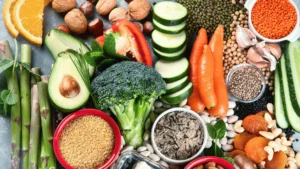Top sources of Plant-based protein
What are plant based proteins
Plant-based proteins are proteins that are derived from plant sources such as legumes, nuts, seeds, and grains. These proteins are an essential part of a balanced diet and are a great alternative to animal-based proteins for individuals following a vegetarian or vegan lifestyle. Not only are they a healthier option for the body, but they also have a lower environmental impact, making them a more sustainable choice.

Protein Supplements
For individuals who struggle to meet their daily protein requirements through whole food sources alone, protein supplements can be a convenient and effective way to increase their intake. Plant-based protein supplements are widely available and usually come in the form of powders made from a variety of sources such as peas, rice, or hemp. These supplements are highly versatile, can be easily added to smoothies or other recipes, and offer a concentrated dose of protein.
Plant Vs. Animal Protein
When comparing plant-based and animal-based proteins, it is important to consider the nutritional differences and potential health implications. Plant proteins usually have less saturated fat, cholesterol, and calories compared to animal proteins. Additionally, they often contain higher amounts of fiber, antioxidants, and essential nutrients like vitamins and minerals. However, plant proteins may lack certain amino acids that can be found in animal proteins, making it important for individuals on a plant-based diet to consume a variety of plant protein sources to ensure they get all the essential amino acids their bodies need.
Benefits and Risks
A plant-based protein diet offers several benefits for overall health. It has been linked to a reduced risk of chronic diseases, including heart disease, high blood pressure, and certain types of cancer. Plant proteins are also easier to digest, which can be beneficial for individuals with digestive issues. Furthermore, plant-based proteins contribute to a more sustainable and environmentally friendly food system. However, it is important to note that strict plant-based diets may have certain risks, such as deficiencies in specific nutrients like vitamin B12, iron, and omega-3 fatty acids. Therefore, careful meal planning and attention to nutrient intake is crucial for those following a plant-based diet.
Summary
Plant-based proteins are a valuable and sustainable source of nutrition for individuals following a vegetarian or vegan lifestyle. They offer numerous health benefits while having a lower impact on the environment compared to animal-based proteins. Protein supplements can be a useful tool to meet daily protein needs, especially for those who struggle to obtain enough protein from whole foods alone. However, it is important to be mindful of potential nutrient deficiencies and ensure a well-rounded diet to reap the maximum benefits of plant-based proteins.